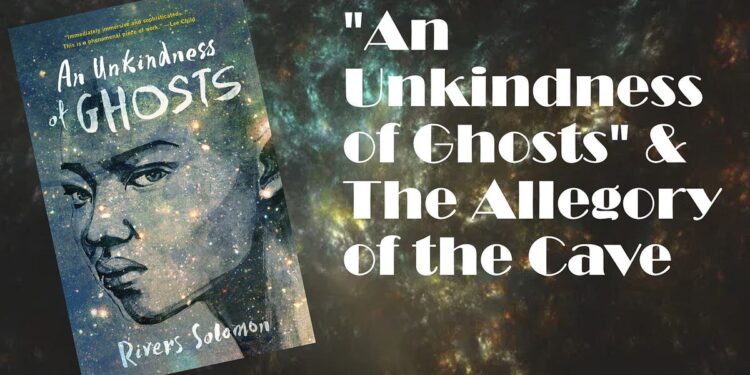Table of Contents
ToggleIntroduction
An Unkindness Of Ghosts Summary By Rivers Solomon An Unkindness of Ghosts is the debut novel by Rivers Solomon, a speculative fiction work that blends science fiction, dystopia, and elements of Afro-futurism. Set aboard a vast, deteriorating spaceship known as the Matilda, the novel explores themes of identity, trauma, social inequality, and the human desire for freedom and justice. Solomon’s narrative is set in a future where the remnants of humanity have fled Earth, and the surviving population is confined to this ship. The ship is structured according to rigid hierarchies, with a stark division between the upper and lower decks, mirroring the systemic oppression found in real-world societies.
At the heart of the story is Aster, a young woman who navigates the challenges of her life aboard the ship while uncovering painful truths about her family, society, and the oppressive system that governs their existence. With a deep exploration of race, gender, trauma, and resilience, An Unkindness of Ghosts challenges readers to confront the legacies of historical injustices while imagining a future that is both hopeful and deeply critical of existing power structures.
The novel is widely recognized for its poignant portrayal of the experiences of marginalized communities, its intricate world-building, and its layered narrative, which weaves together personal, political, and historical themes.
Summary of An Unkindness of Ghosts
The Setting: The Ship Matilda
The story of An Unkindness of Ghosts is set aboard the Matilda, a massive spaceship that has been carrying the remnants of humanity through the stars after the destruction of Earth. The ship itself is a microcosm of a deeply stratified society, with the lower decks inhabited by those who face severe oppression and the upper decks where the privileged few live in comfort and safety.
Read more
The ship’s culture is based on strict social divisions that are enforced by a ruling class, the Autarchs, who dictate the lives of everyone aboard. These divisions are so extreme that they have permeated the structure of the ship, with a clear hierarchy separating the oppressed, working-class passengers from the elite. Those who reside on the lower decks face harsh conditions, such as overcrowding, poverty, and brutal treatment by the upper-class overseers. In contrast, the upper decks are filled with wealth and relative safety, and the elite live without the threat of violence or deprivation.
A key feature of the novel is the Ghosts—a group of individuals whose identities have been erased, but whose spirits continue to haunt the ship, metaphorically speaking. These “ghosts” represent the unseen, the oppressed, and those who are ignored by the system.

Aster: The Protagonist
Aster is a brilliant but disaffected young woman who lives on the lower decks of the Matilda. She is a scientist and healer, an autodidact who has learned her craft by studying the ship’s medical records and archives. Aster is determined to use her intellect to uncover the secrets surrounding the mysterious deaths of her mother, as well as the painful realities of the ship’s dark past. Aster is also marked by personal trauma, especially the death of her mother, Agnes, who was a prominent figure on the lower decks and a leader in the fight against oppression.
Aster’s journey is driven by her desire to understand the true nature of the ship, the role her mother played in its history, and the forces that continue to perpetuate the systemic cruelty aboard the Matilda. Her investigation into the ship’s medical systems and her search for answers gradually unravel the web of lies and violence that sustain the power structures of the ship.
Throughout the novel, Aster is portrayed as someone caught between her desire for justice and the limitations imposed on her by her gender and race. She grapples with being both an outsider and someone with potential, trying to bridge the gap between the world of the upper decks and the life of suffering in the lower decks. Aster’s relationships with others are shaped by her own trauma, her status as a person of color, and the limitations of the world she inhabits.
Themes of Trauma and Memory
One of the central themes of the novel is the exploration of trauma, especially intergenerational trauma. Aster’s life is shaped by the trauma of slavery and systemic oppression, which is mirrored in her struggle to understand and reclaim her own identity. Her mother’s death and the mystery surrounding it provide the key to unlocking many of the novel’s deeper themes. Through Aster’s perspective, the novel critiques how societies—and especially oppressed groups—carry the weight of historical trauma and memory.
Aster’s quest to uncover the truth about her mother’s death also reflects her journey of self-discovery and healing. Throughout the book, memory is not just a tool for Aster to uncover the truth; it is also a method of healing and a way of making sense of her place in the world. The ghosts of the past haunt Aster as much as they haunt the ship, and her exploration of these memories is essential to her survival and transformation.
Oppression and Resistance
The novel’s depiction of class, race, and gender inequalities aboard the Matilda is a direct reflection of the real-world systems of oppression that exist in society. The harsh divisions between the upper and lower decks echo historical systems of slavery, apartheid, and systemic discrimination, where individuals are dehumanized and forced into subordinate roles based on race, class, or gender.
Aster’s efforts to challenge the oppressive systems on the ship are not just personal; they also represent a broader resistance to injustice. Throughout the book, she builds alliances with others who are also disenfranchised—like Guthrie, a friend who works as a soldier on the lower decks, and Dr. Alexandre, a sympathetic doctor on the upper decks. These relationships provide Aster with the support she needs to confront the brutal realities of the Matilda and fight for a better future.
Resistance in An Unkindness of Ghosts takes many forms: intellectual resistance, emotional resistance, and, at times, violent rebellion. The novel suggests that true liberation is both an internal and external process, and that healing requires both individual transformation and collective action.
A Future of Hope and Change
While An Unkindness of Ghosts is a dark and dystopian story, it is also about hope, resilience, and the possibility of change. Aster’s journey is one of self-liberation, as she not only fights for the truth about her mother’s death but also seeks a deeper understanding of herself. As she uncovers the dark history of the Matilda, she realizes that the way forward may require a complete dismantling of the systems that perpetuate inequality, both on the ship and in the broader human history.
The novel ends on a note of possibility, hinting that the struggles for justice and equality can lead to a brighter future—even in the face of seemingly insurmountable odds.
Read more
Themes in An Unkindness of Ghosts
1. Race, Identity, and Social Hierarchies
A key theme in An Unkindness of Ghosts is the way in which race and identity influence the lives of individuals, particularly within systems that are built on inequality. Aster, a Black woman in a society where people are marked by their social status, challenges the boundaries of race and class. Solomon uses Aster’s experiences to critique the ways in which social hierarchies shape the identities of marginalized individuals.
2. Trauma and Healing
Another important theme is the exploration of trauma, particularly historical trauma, and its effects on individuals and communities. The novel delves into how past experiences—especially experiences of violence and oppression—affect future generations. Aster’s journey toward healing is symbolic of the broader need for collective healing in society. The concept of trauma is deeply woven into the structure of the novel, making it clear that healing is both personal and societal.
3. Oppression and Resistance
The theme of resistance runs throughout the book, reflecting the broader human struggle against systems of oppression. The novel emphasizes that resistance takes many forms, and even small acts of defiance can challenge the status quo. Aster’s personal journey of resistance becomes a larger metaphor for the fight against dehumanization and exploitation.
Read more
4. The Legacy of the Past
In An Unkindness of Ghosts, the past is never truly gone. The history of oppression aboard the Matilda continues to haunt its inhabitants, shaping their actions and their identities. Solomon explores how the past, both personal and collective, continues to influence the present and future. Aster’s search for the truth about her mother’s death is also a search for the larger history of the Matilda and the ways in which history shapes society’s structures.
5. Freedom and Liberation
The novel portrays the struggle for freedom and liberation, both on a personal and collective scale. Aster’s journey is not just about discovering the truth about her mother but also about finding a way to free herself and others from the shackles of a deeply oppressive system. The novel suggests that true freedom requires dismantling the systems of power that limit individual and collective potential.

Conclusion
An Unkindness of Ghosts by Rivers Solomon is a striking, thought-provoking novel that combines science fiction, social critique, and deep emotional storytelling. Through the journey of Aster, the novel tackles the themes of trauma, race, resistance, and the search for justice in an oppressive society. Solomon’s world-building is rich and detailed, and the novel’s complex characters and vivid exploration of the human condition offer a powerful commentary on the ways in which history, identity, and power shape the lives of individuals. Through Aster’s struggle, the novel offers a poignant exploration of the human desire for freedom and self-determination, making An Unkindness of Ghosts an essential read for anyone interested in the intersections of science fiction, history, and social justice.
Read more
1. What is the significance of the title An Unkindness of Ghosts?
The title of the novel references both the literal ghosts that haunt the ship and the metaphorical ghosts of the past—particularly the trauma and history of oppression that continue to haunt the survivors aboard the Matilda. “Unkindness” alludes to the cruel system that continues to affect the lives of those on the lower decks.
2. What role does science fiction play in the novel?
Science fiction serves as a lens through which the novel critiques social and political systems. The futuristic setting of the Matilda allows Solomon to explore issues such as race, class, and power in a speculative environment, using the ship as a metaphor for the ways in which societies reproduce and perpetuate inequality.
3. Is the book part of a series?
No, An Unkindness of Ghosts is a standalone novel. However, Rivers Solomon’s other works, such as The Deep and Sorrowland, continue to explore similar themes of identity, trauma, and resistance.
4. How does the novel address issues of gender?
Gender plays a significant role in the novel, particularly through Aster’s experiences as a Black woman. Gender inequality is an aspect of the oppressive structures that govern life aboard the Matilda, and Aster’s journey is marked by both the challenges of being a woman and the desire to assert her autonomy and power.
5. What is the main message of An Unkindness of Ghosts?
The central message of An Unkindness of Ghosts is the possibility of liberation in the face of systemic oppression. The novel emphasizes the need for healing from past traumas and highlights the ways in which resistance and solidarity can lead to transformation, both personally and socially.

















